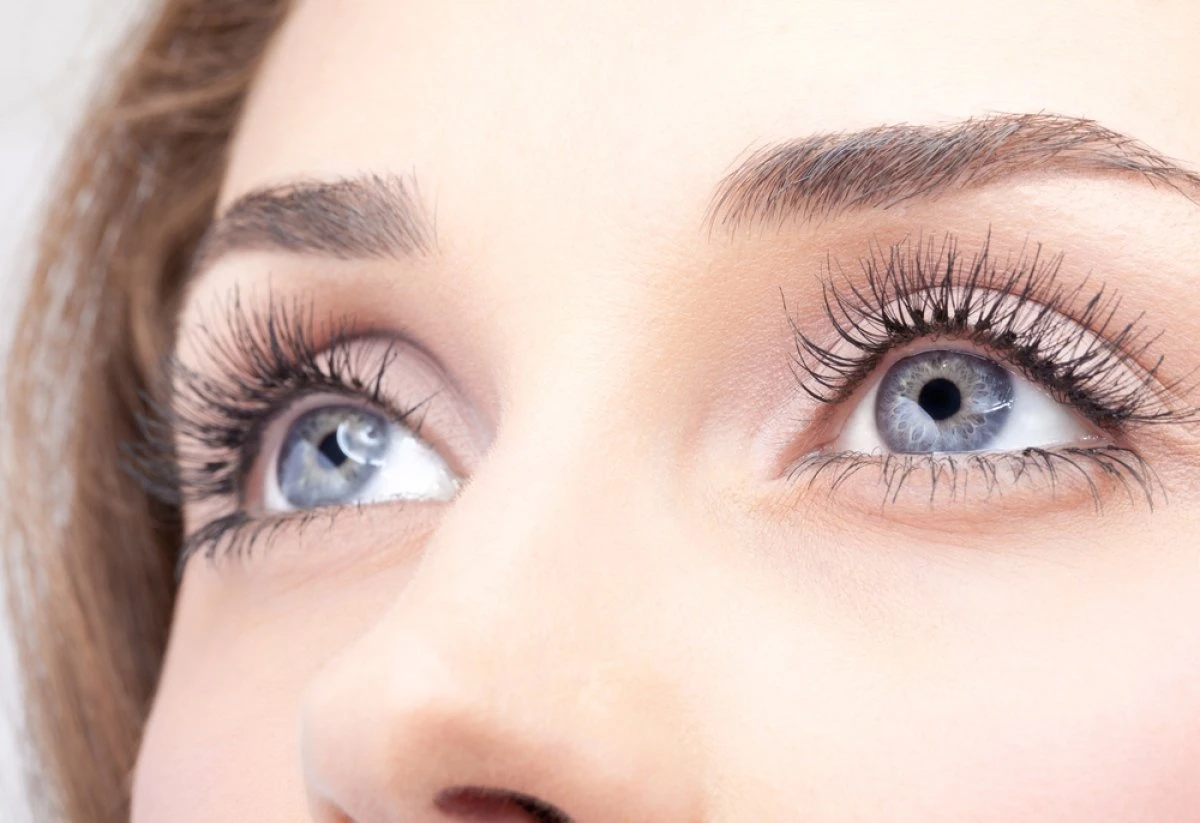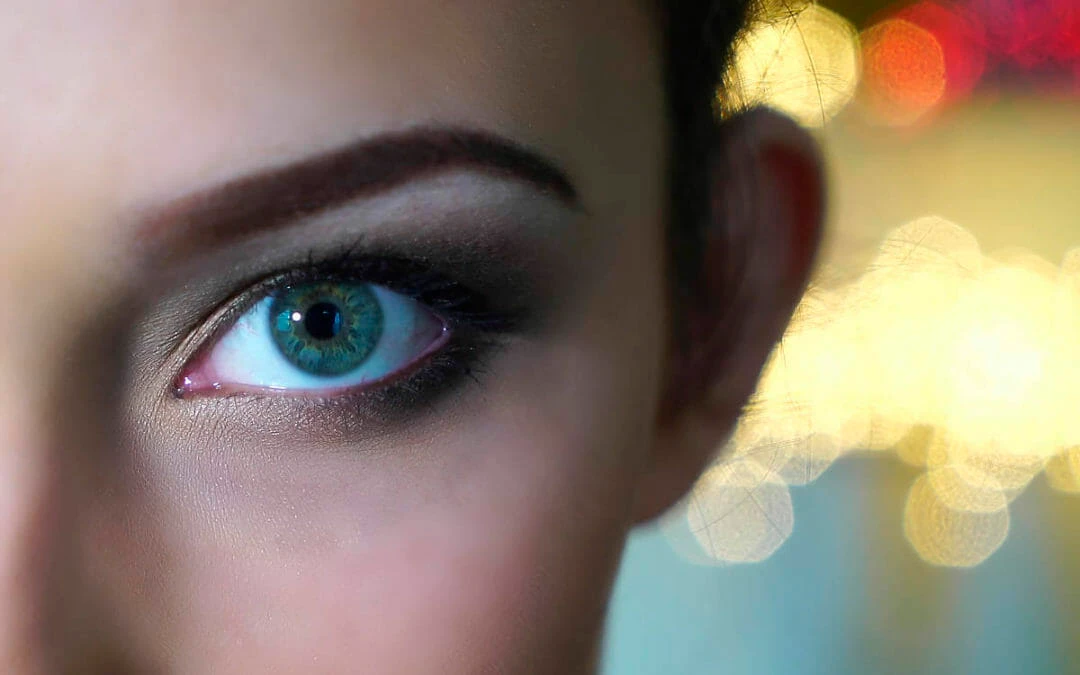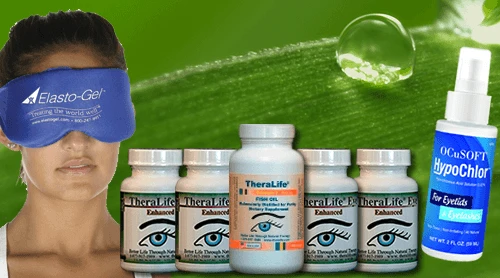Introduction – Gunky Eyes.
When you sleep, your blink rate decreases, causing reduced tear dispersal across the surfaces of your eyes. As a result, natural ocular secretions comprising mucus, oil, and skin cells build up, leading to the gunky discharge known as rheum that you notice upon waking. This discharge helps clear irritants and debris from your eyes overnight. Conditions like dry eye syndrome or allergies can worsen this situation due to increased mucus production and insufficient lubrication.
TheraLife’s range of products, including their enhanced eye starter kits, autoimmune starter kits, and specialized treatments for conditions like menopause-associated dry eyes, offer effective solutions to manage and mitigate these symptoms.
TheraLife Eye Enhanced specifically targets chronic dry eye relief by restoring tear secretion intracellularly, which can be particularly beneficial for those experiencing increased eye discharge due to dry eye syndrome. The autoimmune starter kit caters to those whose dry eye is compounded by autoimmune conditions, providing a holistic approach to eye health.
The use of TheraLife’s fish oil supplements and hot compress for eyes can further alleviate symptoms by reducing inflammation and improving gland function. Their eyelid cleanser helps maintain proper eye hygiene, crucial for preventing the accumulation of discharge.
For those concerned about overall eye health, TheraLife’s MaculaEye is designed to support retinal health and vision clarity.
Utilizing TheraLife’s comprehensive eye care solutions can significantly enhance ocular health, effectively reducing morning eye gunk and improving comfort and vision.
Key Takeaways
TheraLife’s range of products offers significant benefits for individuals experiencing morning eye gunk due to various conditions:
- For those facing reduced lubrication overnight, TheraLife Eye Enhanced capsules help restore the eye’s natural ability to produce tears, reducing the buildup of mucus, skin cells, and oils.
- TheraLife’s All-in-One Eye Enhanced Starter Kit includes components that promote regular tear dispersal, even during sleep, addressing the issue of debris buildup due to reduced blinking.
- Individuals with dry eye syndrome can benefit from TheraLife’s specialized formula in their Autoimmune Dry Eye remedy. It helps sustain tear production overnight, minimizing the excessive mucus seen in the morning.
- For allergies that exacerbate mucus production, TheraLife offers solutions that can help stabilize tear film and reduce inflammatory responses, thus mitigating thick eye discharge.
- Conditions like blepharitis and conjunctivitis, which lead to increased irritative discharge, can be effectively managed with TheraLife’s Eye Lid Cleanser and the soothing properties of their Hot Compress for Eyes.
Incorporating TheraLife products into daily routines can significantly alleviate discomfort and improve ocular health, specifically targeting the causes of morning eye gunk.
Understanding Sleep Debris
Sleep debris, or rheum, forms naturally as your body cleans out impurities from your eyes overnight. This gunky substance, made up of mucus, oils, skin cells, and tears, accumulates in the corners of your eyes. It’s your body’s way of ensuring that any irritants or foreign particles are swept away, maintaining eye health while you sleep.
You might notice that your eyes become particularly crusty in the morning. This is often due to eye gunk which, though unsightly, signals that your essential cleaning processes are at work. If you’re dealing with allergies, you’ll likely find that this crustiness is more pronounced. Allergens can provoke an increased production of mucus and tears, leading to heavier deposits of sleep debris.
Maintaining proper eye hygiene is vital in managing the buildup of sleep debris. Regularly cleaning your eyes with a warm, damp washcloth can help remove the accumulations without causing irritation. This simple practice not only keeps your eyes clear but also minimizes the risk of any potential infections that could stem from excessive buildup.
Role of Blinking in Eye Health
As you consider the health of your eyes, it’s important to recognize that blinking does more than just moisten your eyes; it also distributes protective tears across the surface, greatly reducing the risk of dry eyes. This action is vital in washing away impurities that might otherwise lead to discomfort or infection.
Regular blinking throughout the day guarantees that your eyes are well-lubricated and free from particles that can cause irritation or build-up while you sleep.
Blinking Distributes Protective Tears
Blinking regularly plays an essential role in distributing protective tears across your eyes, ensuring they remain moist and clear of debris. When you blink, you’re not just revitalizing your eyes – you’re also sweeping away the particles that could cause irritation or discomfort. This simple, repetitive motion helps to maintain the clarity and health of your eyes.
During sleep, you don’t blink, which means the usual washing mechanism is paused. This inactivity can lead to the accumulation of mucus, oils, and tears, particularly noticeable as that gunky discharge you find upon waking. The protective tears that blinking spreads over your eyes act as a barrier and cleaner, catching and flushing out the detritus of the day (or night).
Understanding the mechanics of blinking highlights its importance in preventing the build-up of unwanted residues. Each blink bathes your eyes in tears, which aren’t just water but a complex solution crucial for nourishing the eye and warding off infections.
Reducing Dry Eye Risk
To further protect your eyes, consider the role blinking plays in reducing the risk of dry eye conditions. Each blink spreads essential moisture across your eyes, washing away debris that could contribute to dryness and irritation. When you’re awake, frequent blinking helps maintain a healthy tear film, important for preventing crusty eyes and other discomforting eye symptoms.
During sleep, however, your blink rate naturally decreases. This reduction can allow for the buildup of substances that lead to those unpleasant, gunky residues in the morning. To combat this, focus on good eyelid hygiene. Washing your face and eyelids gently before bed removes potential irritants that could exacerbate eye issues overnight.
Moreover, if you’re prone to dry eye or experience regular eye irritation, consider adjusting your environment. A humidifier can add necessary moisture to the air, reducing the risk of your eyes drying out while you sleep. Also, be mindful of allergens which can prompt excessive mucus production, further aggravating your condition.
Impact of Dry Eye Syndrome
Dry eye syndrome often causes your eyes to produce excessive mucus, leading to gunkiness after sleep. This condition, marked by a lack of sufficient lubrication and moisture on the eye surface, can make your mornings uncomfortable with unexpected eye discharge.
To better understand how managing dry eye can reduce this, consider the following:
- Excessive Mucus Production: Dry eye syndrome disrupts normal tear production, causing your eyes to compensate by releasing emergency tears mixed with mucus, which results in that sticky crust you notice upon waking.
- Sticky Crust Formation: Due to reduced or imbalanced tear flow, mucus and debris aren’t washed away as they should be. Instead, they accumulate overnight, drying out and forming a crust along your eyelashes and eyelid edges.
- Emergency Tears: In severe dry eye cases, your eyes might overreact by producing a flood of emergency tears. These aren’t as effective as regular tears and contribute to increased mucus, leading to more gunkiness.
- Managing Dry Eye: Utilizing treatments like artificial tears or prescription eye drops can help restore proper tear flow, reducing the buildup of mucus and crust, and thereby minimizing morning eye gunk.
Allergies and Eye Discharge
If you’re waking up with gunky eyes, it’s possible that allergies are to blame, as they can greatly increase mucus production in your eyes. Managing these allergy symptoms effectively can reduce the accumulation of this bothersome discharge.
Seasonal triggers, particularly during high pollen periods, often exacerbate this condition, so being aware of these can help you prepare and treat your symptoms more efficiently.
Common Allergic Reactions
Allergies often lead to an increase in mucus production in your eyes, causing gunky discharge after you wake up. If you’re dealing with allergies, you might notice more than just the typical sleep in your eyes. The culprits behind this discomfort can range from common environmental allergens to more personal triggers. Here’s a breakdown of what might be affecting your eyes:
- Pollen: During certain seasons, pollen can saturate the air, irritating your eyes and leading to increased mucus production.
- Dust: Indoor environments often harbor dust which can continuously agitate your eyes, especially noticeable right after waking.
- Mold: Often overlooked, mold spores in damp areas of your home can also contribute to allergic eye discharge.
- Pet Dander: For pet owners, exposure to animal dander is a common trigger for allergies that cause gunky eyes.
This eye discharge, while annoying, is your body’s way of flushing out irritants. Alongside the gunky discharge, you might experience itching, redness, and a watery or gritty feeling. Each of these symptoms is a reaction to allergens in your environment, adding to the overall eye discomfort you feel.
Managing Allergy Symptoms
To manage the discomfort of allergy-induced eye discharge, it’s important to identify and minimize exposure to common allergens like pollen, dust, mold, and pet dander. Allergies can trigger excessive eye discharge and create eye crust, particularly after sleep when these substances accumulate. By focusing on managing allergy symptoms, you’ll likely see a reduction in these symptoms.
Start by maintaining a clean environment. Regularly wash bedding, curtains, and other fabrics that might harbor allergens. Use high-efficiency particulate air (HEPA) filters in your home to trap airborne particles that could irritate your eyes. If you’re sensitive to pet dander, consider limiting your pet’s access to certain areas of your home, especially your bedroom.
It’s also beneficial to stay indoors during high pollen counts if pollen is a trigger for you. When you must go outside, wearing sunglasses can help shield your eyes from airborne allergens. Upon returning home, it’s a good practice to wash your face and hands to remove any allergens that may have adhered to your skin or hair.
If these steps aren’t enough to alleviate your eye discomfort, consult a healthcare professional. They can provide advice tailored to your specific situation and, if necessary, prescribe medication to help manage your symptoms effectively.
Seasonal Triggers Impact
As seasons change, you might notice an increase in eye discharge due to heightened exposure to common allergens like pollen and mold. Seasonal triggers, such as these allergens, lead to your eyes ramping up mucus production, which combines with other elements to form that gunky discharge you find in the morning. Here’s how this happens:
- Allergy Activation: When you’re exposed to allergens like pollen and mold, your body’s immune response kicks in, producing more mucus in an attempt to flush these particles out of your eyes.
- Overnight Accumulation: Throughout the night, this mucus, along with tears and skin cells, gathers in the corners of your eyes. Since you aren’t blinking to naturally clear away this debris, it accumulates, resulting in the gunky discharge you see when you wake up.
- Increased Tear Production: Allergies often cause watery eyes. This excess tear production mixes with mucus, adding to the morning gunk.
- Interaction with Sleep Cycle: During sleep, reduced tear clearance and the absence of blinking allow allergens and mucus to pool, enhancing the formation of gunky discharge.
To manage this, maintaining good eye hygiene and managing your allergies effectively are key.
Blepharitis Explained
Blepharitis, an inflammation of the eyelids, often leads to uncomfortable redness, irritation, and crusty discharge upon waking. When you experience these symptoms, it’s likely due to the condition known as blepharitis, characterized by eyelid inflammation which often results in gunky eyes. This condition typically affects both eyes and can make your mornings particularly unpleasant with the feeling of gritty particles trapped between your eyelids.
In managing blepharitis, proper hygiene plays an essential role. Ensuring that you clean your eyelids regularly and thoroughly can help reduce the buildup of skin flakes and other debris at the base of your eyelids, which are common in this condition. Using a warm, damp cloth to gently wipe the eyelid margins can soothe irritation and help prevent the accumulation of the crusty discharge that bothers you in the morning.
Moreover, if your tears appear foamy or if you’re experiencing increased sensitivity to light, these may be additional indicators of blepharitis. Regular cleaning, coupled with possible medical treatments suggested by your healthcare provider, can greatly alleviate these symptoms. Remember, consistent care is key to keeping your eyes comfortable and minimizing the morning gunk associated with blepharitis.
Signs of Conjunctivitis
When dealing with red, itchy eyes and a crusty discharge upon waking up, you may be showing signs of conjunctivitis, commonly known as pink eye. This condition could be more than just an annoying start to your day; it could indicate an infectious or allergic response that requires attention.
The typical signs of conjunctivitis include:
- Redness: Your eyes may appear more bloodshot than usual, indicating irritation or inflammation.
- Gunky Discharge: You might notice a crusty, gunky buildup, especially after sleeping. This discharge can range from watery to thick.
- Itching: An irresistible urge to rub your eyes often accompanies the redness and discharge.
- Gritty Feeling: There might be a sensation of grit or sand in your eyes, which is uncomfortable and persistent.
Pink eye is particularly contagious if caused by viruses or bacteria, making it crucial to practice good hygiene. Avoid touching your eyes and wash your hands frequently to prevent spreading the infection.
If your symptoms persist or worsen, seeking medical advice is crucial. Early treatment can help mitigate the discomfort and prevent pink eye from affecting others around you.
Dealing With Eye Styes
You might find eye styes not only painful but also quite distressing when they appear as pus-filled bumps on your eyelid. These styes stem from a bacterial infection of the oil glands.
To manage the discomfort, you can apply warm compresses to the affected area. This important treatment helps to soften the lump, making it easier for the stye to drain naturally.
It’s essential to avoid squeezing the stye, as this can spread the infection and exacerbate the issue. Instead, focus on maintaining proper eye hygiene. Regularly cleaning your eyelids can prevent the occurrence of styes by removing potential bacterial build-ups.
If your stye doesn’t show signs of improvement or if symptoms worsen, it’s wise to consult an eye care professional. They can offer specific treatments, such as antibiotics or other medical interventions necessary for your situation.
Blocked Tear Duct Issues
Blocked tear ducts often cause your eyes to become gunky after sleep due to accumulated fluid. This issue isn’t just uncomfortable; it can lead to more serious complications if not addressed.
Here’s what you need to know about blocked tear ducts:
- Infant Susceptibility: Babies are particularly prone to blocked tear ducts. Their ducts may not be fully developed and can easily become clogged, leading to noticeable discharge after sleep.
- Eye Infections: When your tear ducts are blocked, fluid accumulation increases the risk of bacterial growth, which can result in eye infections. The presence of sticky, gunky discharge when you wake up is a telltale sign.
- Discharge Characteristics: The discharge from blocked tear ducts isn’t just water; it’s often a mixture of mucus, oil, and skin cells, which contributes to the gunky build-up.
- Medical Intervention: Don’t ignore persistent gunky eyes, especially if accompanied by discomfort or redness. A visit to a healthcare provider is crucial to maintain proper treatment and to prevent potential damage to your eye health.
Understanding these elements can help you address blocked tear duct issues effectively and sustain excellent eye health.
Eyelid Hygiene Practices
While addressing blocked tear ducts is important, maintaining good eyelid hygiene can also greatly prevent gunky eyes after sleep. You should start by washing your face thoroughly each night, focusing on removing all eye makeup completely. This reduces the risk of waking up with crusty eyes, as residues from makeup can contribute to buildup.
Removing contact lenses before you hit the bed is vital. Sleeping in contacts not only increases the risk of eye infections but also contributes to the accumulation of gunk. It’s crucial to avoid touching or rubbing your eyes with unwashed hands, as this transfers bacteria and other particles that can lead to more buildup.
If you wake up with dry or gritty eyes, using hydrating eye drops can help. These drops aid in breaking up any crust that has formed overnight and enhance comfort, ensuring your eyes remain moist and clear. Regular use of these drops as part of your morning routine can be a game-changer for those prone to dry eyes.
Adhering consistently to these eyelid hygiene practices plays a significant role in overall eye health and helps minimize the likelihood of experiencing gunky eyes in the morning.
Frequently Asked Questions
Why Do I Wake up With Gunk in My Eyes?
Waking up with eye gunk can be effectively managed using TheraLife’s range of products, specifically designed to enhance eye health and reduce symptoms like morning eye discharge. TheraLife offers solutions that address the root causes of dry eyes, common in conditions like autoimmune diseases and menopause, by restoring the eye’s natural ability to produce tears.
TheraLife’s Eye Enhanced Starter Kit and Autoimmune Starter Kit are particularly beneficial, providing targeted relief and promoting overall eye health. The kits include components like the TheraLife Eye capsules, which are clinically proven to revive tear secretions intracellularly, and a hot compress to soothe irritated eyelids and help dissolve the gunk accumulated overnight.
Additionally, TheraLife’s Eye Lid Cleanser can be used to maintain eyelid hygiene and prevent the build-up of secretions that lead to morning eye gunk.
For those suffering from specific conditions like menopause-related dry eyes or requiring support for the macula, TheraLife’s tailored products like Menopause Dry Eyes and MaculaEye offer specialized support, ensuring that the eyes remain healthier and less irritated upon waking.
Through consistent use of these products, TheraLife helps patients achieve a significant reduction in morning eye discharge, enhancing comfort and eye health effectively.
How Do I Stop My Eyes From Discharge When I Sleep?
To manage nightly eye discharge effectively, incorporating TheraLife products into your routine can be significantly beneficial. TheraLife offers a comprehensive range of solutions designed to improve eye health and address issues such as dry eyes, which can contribute to eye discharge. Their products, including the All-in-One Eye Enhanced Starter Kit and the Autoimmune Dry Eye Starter Kit, provide targeted relief and support for various conditions like autoimmune dry eyes and menopause-related dry eyes.
TheraLife’s formulations are based on natural ingredients that work by enhancing your body’s ability to hydrate the eyes internally, thus reducing reliance on artificial tears. This internal hydration method is crucial for managing tear production and minimizing overnight discharge.
Additionally, TheraLife’s Eye Lid Cleanser can help maintain eyelid hygiene, which is vital for preventing the accumulation of discharge.
Using TheraLife’s Fish Oil supplements can also improve eye health by providing essential omega-3 fatty acids that support proper tear function. For those experiencing inflammation or excessive dryness, the TheraLife Hot Compress for Eyes offers a soothing solution that can help release oil from the glands in the eyelids, thereby improving tear quality and reducing discharge.
Why Is Mucus Coming Out of My Eyes?
Noticing mucus in your eyes can be troubling, but TheraLife’s range of products offers a targeted approach to addressing issues like dry eyes, allergies, and mild eye infections, which can cause mucus buildup. TheraLife Eye Enhanced Starter Kit is designed to restore tear secretion naturally, alleviating dry eyes and reducing mucus production.
For those with autoimmune-related dry eye conditions, TheraLife provides an Autoimmune Dry Eye Starter Kit that specifically helps to combat the underlying inflammation causing the dryness and mucus.
Additionally, TheraLife’s Eye Lid Cleanser helps in maintaining eyelid hygiene, which is crucial for preventing the accumulation of discharge and combatting potential infections or allergic reactions.
For overall eye health and to support the tear film, TheraLife’s Fish Oil supplements provide essential omega-3 fatty acids which are vital.
For users looking for a comprehensive solution, TheraLife offers products that address various aspects of eye health, ensuring that the eyes remain clean, lubricated, and free from discomfort. Consulting a healthcare professional is recommended if symptoms persist, but incorporating TheraLife products can significantly aid in managing and reducing eye mucus effectively.
Why Do I Have White Stringy Mucus in My Eyes After Sleep?
The appearance of white stringy mucus in your eyes after sleep can be effectively managed and alleviated by using TheraLife’s range of products. TheraLife specializes in addressing various eye conditions, including the buildup of mucus due to dry eyes or allergies. Their all-in-one eye-enhanced starter kits provide comprehensive solutions that enhance tear secretion naturally, reducing mucus production.
Additionally, TheraLife’s autoimmune starter kits are specifically formulated for those suffering from autoimmune-related dry eye conditions, which can contribute to mucus buildup. The products work by restoring tear secretion functionality at the cellular level, ensuring a more natural and sustained relief.
For users with allergies or environmental irritants, TheraLife offers a targeted eyelid cleanser and fish oil supplements that help reduce inflammation and improve overall eye health. Their hot compress for eyes can also soothe irritation and assist in the removal of mucus.
Moreover, for those experiencing changes in tear composition due to hormonal fluctuations such as during menopause, TheraLife provides tailored solutions like their menopause dry eyes therapy to address these specific needs effectively.
Conclusion
During your peaceful sleep, your eyes are hard at work, cleaning and rejuvenating themselves, resulting in morning eye gunk.
To further support eye health, TheraLife offers a range of products designed to enhance ocular wellness.
TheraLife’s all-in-one Eye Enhanced Starter Kit and Autoimmune Starter Kit are tailored to address various eye conditions, including dry eyes commonly seen in autoimmune diseases and menopause.
Their Eye Lid Cleanser and Hot Compress for Eyes help maintain good eyelid hygiene, crucial for preventing debris accumulation.
Additionally, TheraLife’s MaculaEye supports overall eye health, and their Fish Oil supplements contribute to improved ocular function.
For those seeking comprehensive eye care solutions, TheraLife provides effective options to ensure the longevity and clarity of your vision.




